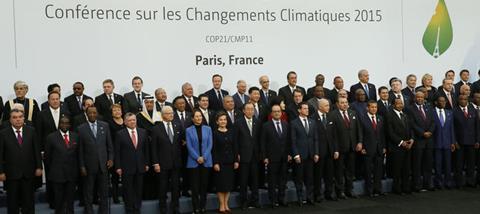
It has been another incredibly mild day on the south coast today - and our daffodils are just days away from coming in to flower. It is a timely reminder that no amount of talking and agreements on paper can slow or stop climate change. It’s all about action.
So what should we make of Paris? Was it all hot air? Or was it a historic agreement that could change the direction of global politics for good?
The answer perhaps is best summed up by Lord Stern chair of the Royal Institute and well known climate scientist: 'This is a historic moment, not just for us and our world today, but for our children, our grandchildren and future generations. The Paris Agreement is a turning point in the world’s fight against unmanaged climate change, which threatens prosperity and well-being among both rich and poor countries. The Agreement creates enormous opportunities as countries begin to accelerate along the path towards low-carbon economic development and growth.'
Something genuinely exciting happened in Paris over the past two weeks. Nearly 200 countries have agreed to a deal that will (if nations focus on the necessary actions) keep us to within a 2C rise in global temperature. If that indeed proves possible then the worst impacts of climate change just might be averted. Rather than it being too little too late, this deal may pluck mankind out of the fire, just before we were about to get seriously burnt.
This is a rare moment for real celebration. But we must not be complacent.
Our Climate Minister Amber Rudd has told us how good the deal was for our children and grandchildren and yet in the same breath suggested that the best economic policy is one that focuses on 'saving us money' rather than saving the planet. Our government has yet to wake up to the fact that this climate agreement will cost all of us necessary money to survive.
To suggest that it is possible to drive down bills while also finding payments to support developing countries move to a low carbon future, to transition our own energy sector and to pay for the extreme flooding and drought events that are with us for years to come is quite simply a lie. It is playing short term politics with our collective futures. It is dangerous and it is wrong.
There is every reason to assume that the progress made will continue. Each country will need to regularly review their 'Intended National Determined Contribution'. In other words we will all be accountable to show how we as nations are driving down carbon emissions to ensure we reach the 1.5C target. But (and it is a big but) each of us need to keep our government focused on the delivery. The current green energy cuts in the UK will not deliver, so we need to keep the pressure on Cameron, Osbourne and others to change the way we do energy and provide the support to the business sector to help transition to a zero carbon future.
Should we be glass half empty or glass half full people in respect to the climate change agreement?' The answer is neither. As my pastor said today in his sermon - 'as Christians we should neither be half full or half empty believers. Instead we need to acknowledge the pain our planet is going through and yet at the same time be filled with peace, joy and above all, hope.' As Romans 15:13 says: 'May the God of hope fill you with all joy and peace as you trust him, so that you may overflow with hope by the power of the Holy Spirit'.
So as a faith community we should now be spurred on to hope filled action. This is both a time to rejoice and be glad as well as to be concerned and keep pushing for delivery on a vital agreement that will indeed determine what kind of future of children and our grandchildren have.
If your church wants to get more involved with action that will make a difference visit arocha.org.uk



